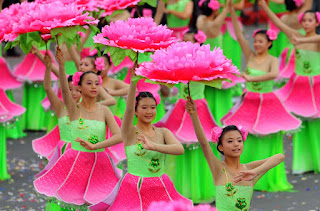 |
| Dancers perform on National Day in Taipei |
Oct. 10 is always a problematic issue among Taiwanese and their supporters, many of whom will argue that the date, which coincides with the birth of the Republic of China in 1911, does not, cannot, stand for Taiwan’s national day. Some have in fact proposed other dates — March 23 (1996), for Taiwan’s first free presidential election, or July 15 (1987), when Martial Law was lifted — to mark Taiwan’s birthday.
The confusion, and perhaps even the resentment, is perfectly understandable. After all, the Republic of China, in its original and repressive iteration, was imposed on Taiwan after World War II and even more so following the Nationalists’ defeat to the communists in 1949. However, over the years, from the authoritarian era to the lifting of martial law, the ROC and the Chinese Nationalist Party (KMT) indigenized, liberalized and democratized, while the old guard, politicians and soldiers who aimed one day to “retake the Mainland,” either passed away or became inactive as the result of old age. With the passage of time, furthermore, a larger percentage of the people alive in Taiwan today were born on the island, and with that, any attachment to “the Mainland” become more distant, a mere abstract that perhaps applied to one’s parents or grandparents, but had little meaning for contemporary people here.
Consequently, rather than colonize Taiwan, it could be argued that Taiwan colonized the ROC and the KMT by forcing both to become localized, and the need to win democratic elections only served to accentuate that transformation. As such, when Taiwanese come out and celebrate National Day, even if they’re wielding the Nationalist flag, in their heart what they’re celebrating is not some tenuous attachment to “the Mainland,” but Taiwan as an independent nation in its own right, built on the sediments of both its history as a colonial subject and as a people that reached out to the outside world to carve its distinct identity.
Taiwan is not unique in that respect. A fact little known to most, my home country, Canada, also celebrates its national day, on July 1, upon colonial foundations: On that day in 1867, the British North American Act, which united three colonies into the British Empire, was enacted. It then became Dominion Day (Jour de la Confédération in French), and only came to be known as Canada Day in 1982 (I was already seven at the time) following passage of the Canada Act. One would be challenged to find a single person among the hundreds of thousands of Canadians who celebrate every July 1 who, in his heart of hearts, does so out of lingering attachment to the old days of British rule. Times changed, identities changed; only the date remained. There’s no reason why it should be any different in Taiwan.
Happy National Day!

No comments:
Post a Comment